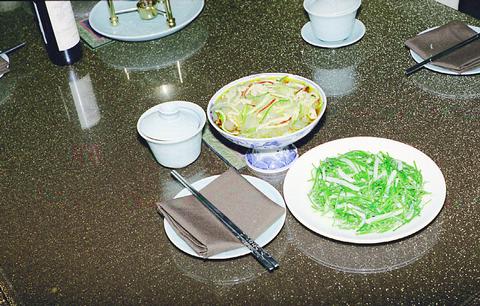Anho Road has never been short on chic spots, and China Pa, which has taken over the spacious premises of the Five Star beer house, has gone all out to impress.
Its entrance, secluded behind vines and iron fencing has a slight aura of the mysterious, and this has been skillfully enhanced by a long hall with museum-style lighting that highlights replicas of Han dynasty statuettes.
The walls of faux-bronze are set off by the tasteful off-white upholstery of the chairs and sofas, strongly suggesting sophistication and a dash of decadence.

PHOTO: IAN BARTHOLOMEW
According to Max Liu (劉明家), one of the young staff who run China Pa, "everything is for sale except the people," and said that a number of the carved wooden tables had been carried off by guests. The creative force behind the restaurant is Roxy Cheng (鄭德絮), formerly of So Moon (攬月) in Yangmingshan. The design of the bar, with its use of old Chinese medicine cabinets to store guest's personal bottles, and carved story windows lining the shelves, gives the bar a interesting look. On the design front, China Pa definitely has personality. Draft Boddington's is another attraction.
As for the food, Liu said that the menu is still in its developmental stage, but aims to focus on Taiwanese cuisine. The dishes currently available, while nothing particularly out of the ordinary, are well-prepared and elegantly presented. Simple dishes such as the fried vegetables with garlic and the hot spicy bean jelly (麻辣托皮) are both reasonably priced and tasty (NT$200 - NT$300 a dish), while the more showy dishes are less dependable at present.
The availability of a wine and cigar selection makes the most of the luxurious lounge area, which is ideal for sitting around and chatting after a meal. Currently the selection is slanted towards cheaper wines in the NT$1,500 range, and good Cubans can be had for NT$500 and upward.
Live music is provided between 9:15pm to just after midnight, ranging through vocals and instrumental jazz in half-hour sets. The jazz lounge effect is obviously something that China Pa is trying to achieve, but at present, it seems unsure exactly how to define itself, trying to offer a bit of everything.
As a stylish place to hang out and drink, China Pa definitely fits the bill, but it has yet to make its mark as a bar or restaurant. But judging from how far it has come in the two months since it opened, China Pa has considerable potential and deserves to be checked out.

On April 26, The Lancet published a letter from two doctors at Taichung-based China Medical University Hospital (CMUH) warning that “Taiwan’s Health Care System is on the Brink of Collapse.” The authors said that “Years of policy inaction and mismanagement of resources have led to the National Health Insurance system operating under unsustainable conditions.” The pushback was immediate. Errors in the paper were quickly identified and publicized, to discredit the authors (the hospital apologized). CNA reported that CMUH said the letter described Taiwan in 2021 as having 62 nurses per 10,000 people, when the correct number was 78 nurses per 10,000

As we live longer, our risk of cognitive impairment is increasing. How can we delay the onset of symptoms? Do we have to give up every indulgence or can small changes make a difference? We asked neurologists for tips on how to keep our brains healthy for life. TAKE CARE OF YOUR HEALTH “All of the sensible things that apply to bodily health apply to brain health,” says Suzanne O’Sullivan, a consultant in neurology at the National Hospital for Neurology and Neurosurgery in London, and the author of The Age of Diagnosis. “When you’re 20, you can get away with absolute

May 5 to May 11 What started out as friction between Taiwanese students at Taichung First High School and a Japanese head cook escalated dramatically over the first two weeks of May 1927. It began on April 30 when the cook’s wife knew that lotus starch used in that night’s dinner had rat feces in it, but failed to inform staff until the meal was already prepared. The students believed that her silence was intentional, and filed a complaint. The school’s Japanese administrators sided with the cook’s family, dismissing the students as troublemakers and clamping down on their freedoms — with

As Donald Trump’s executive order in March led to the shuttering of Voice of America (VOA) — the global broadcaster whose roots date back to the fight against Nazi propaganda — he quickly attracted support from figures not used to aligning themselves with any US administration. Trump had ordered the US Agency for Global Media, the federal agency that funds VOA and other groups promoting independent journalism overseas, to be “eliminated to the maximum extent consistent with applicable law.” The decision suddenly halted programming in 49 languages to more than 425 million people. In Moscow, Margarita Simonyan, the hardline editor-in-chief of the